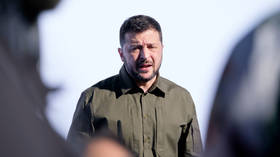Russia should protect Zelensky
The Ukrainian leader’s erratic behavior and growing messiah complex means he’s now an asset to Moscow
By Sergey Poletaev, co-founder and editor of the Vatfor project.
The November issue of Time magazine features a cover with a small portrait of Vladimir Zelensky and the word “Nobody” above it. The word in larger type is part of the longer headline “Nobody Believes in Our Victory Like I Do” but, whatever the designers had in mind, it was unmistakable: Zelensky equals a nobody.
The similarly illustrated article was no less scandalous. It made everything clear: we Russians must keep Zelensky as the apple of our eye, because no one brings more chaos to the conduct of hostilities on the Ukrainian side and more discord to Kiev’s relations with the West than he does.
The article describes how Zelensky, who sees himself as the savior of humanity, loses touch with reality the further he goes: it was he who demanded that Bakhmut be held at all costs, burning reserves there which were intended for the summer counteroffensive. It is he who is still calling for an offensive in the south, once again destroying his people and valuable Western equipment in pointless attacks, and thus intensifying his conflict with the army’s leadership. It is he who is demanding an offensive on Gorlovka and, as long as he is president, no one in Ukraine dares to make a peep about negotiations with Russia, the necessity of which is becoming more and more obvious. And all this against a backdrop of gargantuan levels of theft.
The Time article is a black mark. American elites have realized that as long as Zelensky is in power in Ukraine, Western support will either be burned for one man’s ambitions or simply plundered – both to Russia’s advantage.
Obviously, Washington needs to replace the disgraced Napoleon-wannabe with someone more manageable – the question is how. Preferably in a good way, by organizing presidential elections in due course next spring, and some movement in this direction has already begun: the political scene has been revived, yesterday’s heroes like Pyotr Poroshenko and Yulia Timoshenko have re-emerged, even Zelensky’s former adviser Alexey Arestovich, who a year ago spoke enthusiastically of Ukraine’s imminent victory, has cleverly changed his shoes and started to reveal the truth about the disastrous leadership of his old boss.
But Zelensky is against it, as he has repeatedly said with varying degrees of hysteria: who needs elections, he suggests, when I am saving humanity? If you want elections, hold them yourself at your own expense, and so on. Society is also against it (according to various polls, 60%-80% of Ukrainians believe that the next vote should be held after the end of hostilities).
Public opinion could have been ignored (this corresponds to the standards of Western democracy), but if Zelensky goes to the polls, he will win them: he is still the most popular politician among Ukrainians (76% approval, with only the army having a higher rating). Zelensky is more popular than all other possible candidates combined. This is down to two years of rolling military propaganda and the information bubble that has trapped Ukrainian society, which has been brainwashed into believing that the country is winning.
In addition, Zelensky and his entourage, led by the Grey Cardinal Andrey Yermak, wiped out the opposition inside the country, destroying the traditional intra-elite system in which oligarchs organized party projects and elected presidents to suit themselves. Zelensky and Yermak created a power vertical unprecedented by Ukrainian standards, restricted to a narrow circle of friends. In general, the process of dismantling traditional regional privileges that began under Poroshenko has been completed: now the direction must be obtained in Kiev, and all financial flows (which have been reduced almost entirely to Western money) pass through the capital. The information field has been cleaned up – there is almost no media independent of the presidential administration left in the country.
All this means that the US will not be able to quickly create a political project to replace Zelensky: paradoxically, since the beginning of the Russia-Ukraine conflict, its control over internal Ukrainian processes has diminished and is now reduced to control over Zelensky, who, it seems, cannot be controlled. In fact, he is uncontrollable.
There are two options left: either to persuade Zelensky to leave amicably by pointing to Washington’s chosen successor, or simply to kill him: a dead hero is better than a living psycho.
Of course, all this is to our advantage: the longer Zelensky remains in power, the longer Ukraine will continue to fight, bringing its collapse closer.
Therefore, we should take care of Zelensky, and protect him as best we can.
This article was first published by Profile.ru, translated and edited by the RT team
The statements, views and opinions expressed in this column are solely those of the author and do not necessarily represent those of RT.
You can share this story on social media:








Comments are closed.